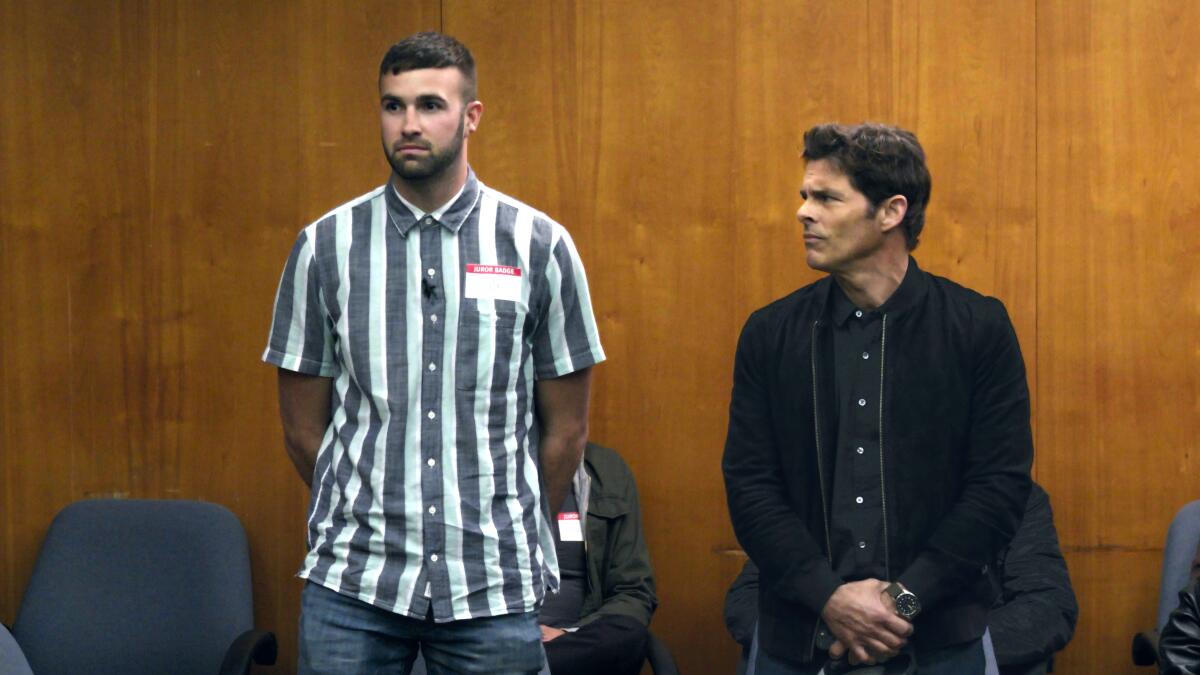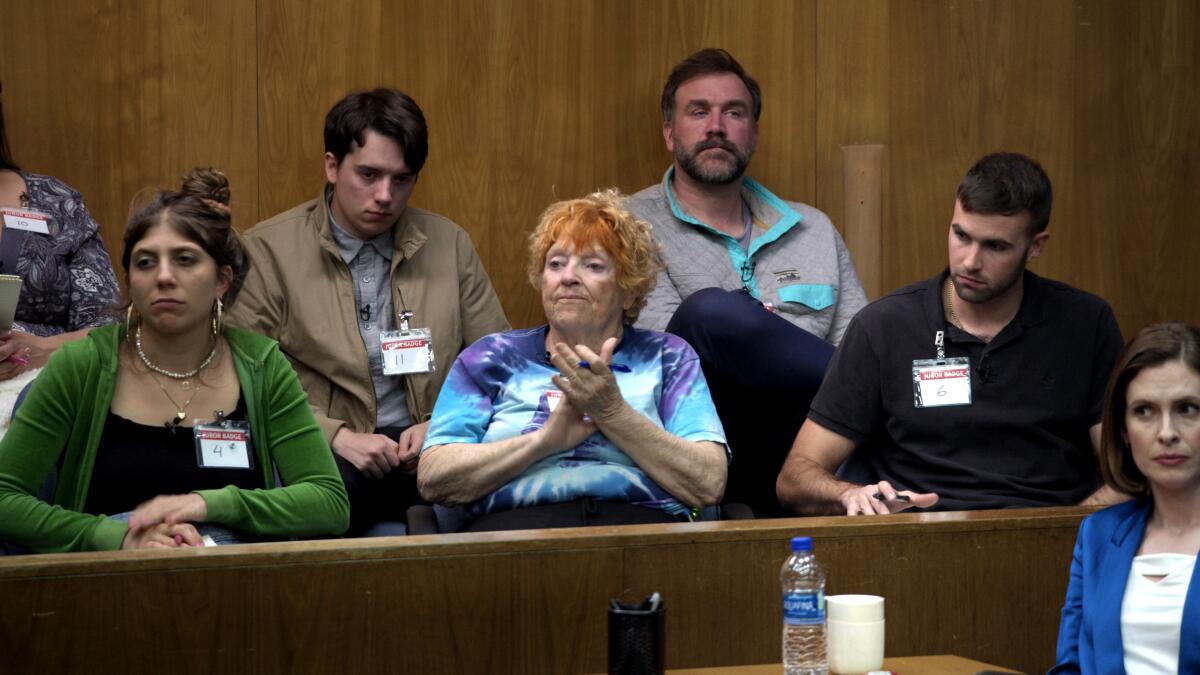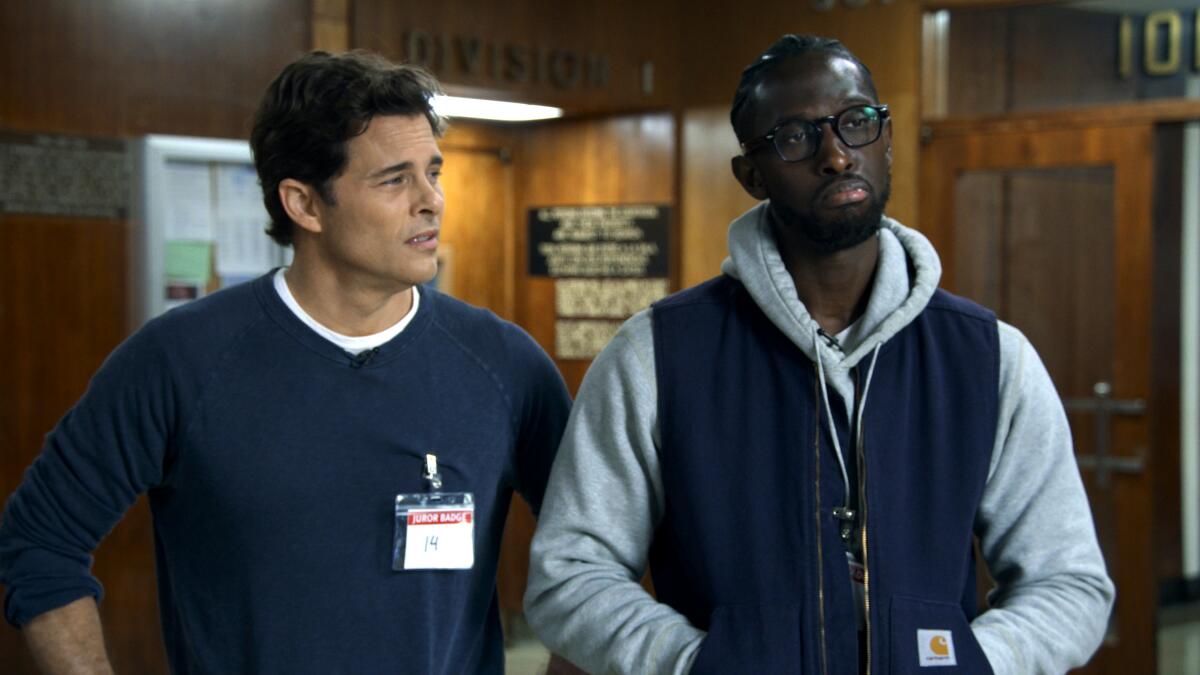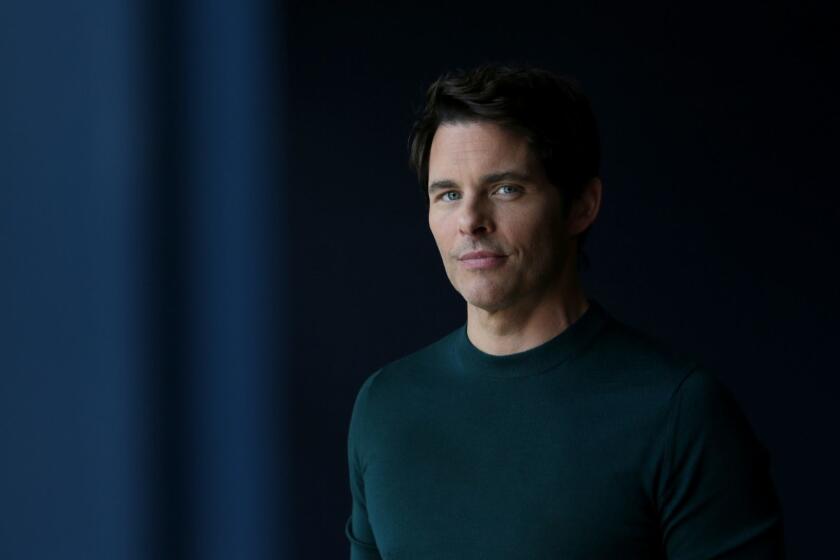Serving on a jury in L.A. can be tedious work. But what if neither the case nor jury is real?

- Share via
If there was ever someone who might have caught on to the fact that they were the mark in Amazon Freevee’s experimental documentary show “Jury Duty,” it was Ronald Gladden.
“Funnily enough, I was the one pulling the pranks growing up,” the San Diego resident said recently over a video call, reflecting on his experience as the unknowing character starring in his very own mini “Truman Show.” But even for someone with an eye for pranks, Gladden, 30, met his match on this one.
“Anytime after something crazy happened, for the rest of the day, it was boring legal jargon, it was hearing testimony, it was presenting evidence — it was literally as dry as they could make it,” he said. “And I thought to myself, ‘If this really is reality TV, this show is going to suck.’”
As it turns out, the hours of courtroom tedium were one of the many deliberate strategies used to keep Gladden in the dark and to create an entire television show about an average Joe serving on a jury — without revealing to him that he was the star. The show premiered on April 7 and the finale is now available to stream.
In 2021, Gladden, then a solar contractor, responded to a Craigslist ad soliciting people to take part in a documentary about the jury process. After being selected for the project, he was under the impression that he was deliberating on a real civil case at a Huntington Park courthouse. Except everyone involved — from the judge to the bailiff to the rest of the jury — was an actor, performing an improvisational script. As the story went from the jury selection to the ruling, Gladden was living inside a fake, choose-your-own-adventure sitcom.
“I had zero confidence that I could pull this off,” said showrunner Cody Heller. “It was a terrifying idea.”

Heller came from the world of scripted comedies, writing for shows like “Wilfred” and “Kidding,” and the creators, Gene Stupnitsky and Lee Eisenberg, are best known for their work on the American version of “The Office.” A number of other producers — including Nicholas Hatton and Todd Schulman — worked on various projects with Sacha Baron Cohen, including “Borat Subsequent Moviefilm” and “Who Is America?” The result of this hodgepodge team is a product that feels something like watching “12 Angry Men” directed by Christopher Guest.
Still, even for the producers who had experience helping Cohen achieve his trickster visions, this was uncharted territory. “In [Cohen’s] situation, it’s one person going into an uncontrolled environment, and you look after that guy,” Hatton said. “This was building essentially a fake village, dropping someone into it — and then it’s a case of you’re really looking out for him.”
In order for the show to work, all of the actors involved had to be relative unknowns so that Gladden wouldn’t recognize them. But there was a notable exception: James Marsden, who plays … James Marsden. The 49-year-old actor plays a satirized version of himself, who is unable to escape his jury summons, and is vocally indignant about it in the process. But as he gets strung along, he grows attached to the rest of the jury — and to Ronald, in particular, who eventually sees a more vulnerable side of the actor. (“Let’s all feel sorry for the guy from ‘The Notebook,’ who’s not even the guy from ‘The Notebook,’” Marsden groans at one point.)
James Marsden knows a thing or two about being pegged as the bad-guy love interest.
“It was like being on the greatest amusement park ride for four or five hours [a day],” said Marsden on a video call, describing how he essentially had to stay in character at all times while on set. “Because you’re not only constantly trying to think of something funny to do, or something that might be entertaining — you’re also making sure you’re not the one that screws the whole thing and upsets the apple cart.”
Marsden, whose more recent credits include “Sonic the Hedgehog” (“I heard that was not a good movie,” Gladden tells Marsden upon meeting him), isn’t known for roles that involve improv or satire. But he said he’s a fan of programs like “Curb Your Enthusiasm” and “The Larry Sanders Show,” and was excited to try out a version of something like them. “That’s my kind of comedy,” Marsden said.
But ultimately, those shows had stand-ins and craft-service tables — and they didn’t star a non-actor who thinks everything is real. So, just what kind of comedy are we talking about here? Just what kind of show is “Jury Duty,” anyway?
“With each passing day, the [television] landscape becomes more clouded, and even the words used to describe it manage to fail us,” said Peter Funt, one of the longtime hosts and producer of “Candid Camera,” the iconic hidden-camera show.
“Candid Camera” was created by Peter’s father, Allen Funt, in 1948, and it ran in various forms off and on until 2014. Its legacy is significant in the modern entertainment landscape, inspiring shows like “Jackass,” “Nathan for You” and even YouTube pranksters. But despite being best known for the “prank” element, it was never the primary focus of “Candid Camera,” as Funt sees it.
“Our goal was really studying people with the wonderful tool of a hidden camera,” he explained. “And in my dad’s dream view of ‘Candid Camera,’ it would have been far more sociology and psychology, and a lot less comedy entertainment.”

Kathleen Vohs, a psychologist and behavioral economist at the University of Minnesota, has studied the psychology of exploitation, and sometimes shows clips of “Candid Camera” in her classes. There’s one “Candid Camera” clip in particular that she uses to emphasize the power of social norms. A group of people get on an elevator and stand backward, all facing the elevator wall. The mark in these clips will inevitably follow suit and turn around, even if they clearly feel ridiculous doing it.
“A lot of things that we do are just straight-up convention,” said Vohs. “There’s no real purpose behind them.”
Vohs explained that, as a species, humans are socially nimble and successful in part because of the way we attempt to imitate those we perceive as being leaders. If a whole group of people turn around in an elevator, for example, you’re going to assume that they’re all doing it for a good reason. “We just emulate everything about [those who are perceived as a leader], including things that are completely superfluous to why they are a leader,” she said.
“Jury Duty” could be seen as a very detailed “Candid Camera”-style sociological experiment, with Gladden doing his best to go with the flow. But even as vulnerable as he was, the verdict was unanimous on the production side — they wanted to build Gladden up and make him the hero of his own journey. Heller, Hatton and Marsden felt that, actually, the whole setup wasn’t a prank.
“That was of paramount importance to me from the beginning,” said Marsden. “I’m not interested in humiliating somebody who’s in the dark.”
Of course, Gladden signed up for something far different than what he was subjected to, so it’s possible he could have come out of this feeling duped. But there’s a reason the production chose him in the first place: He’s just a good-natured guy, plain and simple.
“The best way that I would describe it is that these people put me on a moral obstacle course,” said Gladden. “I don’t feel like I got pranked at all.”
Marsden said he “never worked on something that I have more things to say about,” and noted that he remains friends with Gladden now that the show has wrapped filming.
“I learned as much about myself,” Marsden said, “as I’m sure Ronald did.”
‘Jury Duty’
Where: Freevee
When: Anytime
Rating: 16+ (may be unsuitable for children under the age of 16)
More to Read
The complete guide to home viewing
Get Screen Gab for everything about the TV shows and streaming movies everyone’s talking about.
You may occasionally receive promotional content from the Los Angeles Times.







